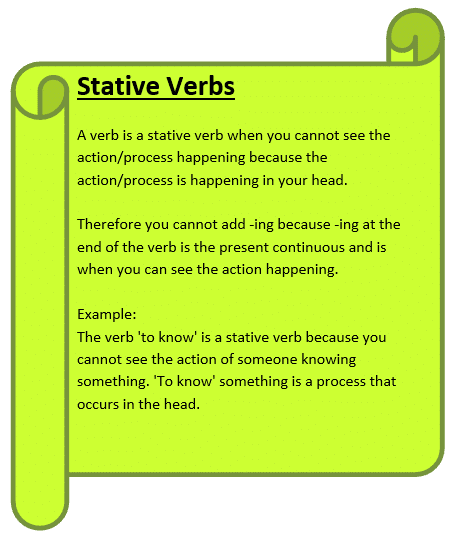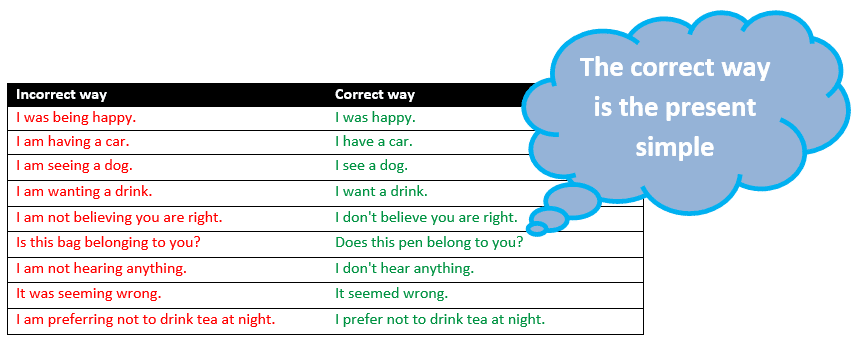Table of Contents
Week 1 | English Grammar
Day 4 |I am doing (present continuous)
Day 5 |Are you doing? (present continuous questions)
Day 6 |I do/work/like (present simple)(present continuous questions)
Week 2 | English Grammar
Day 1 |I don't... (present simple negative)
Day 2 |Do you...? (present simple questions)
Day 3 |I am doing (present continuous) I do (present simple)
Day 4 |I have... and I've got...
Day 6 |Worked/got/went etc (past simple)
Week 3 | English Grammar
Day 1 |I didn't... did you...? (past simple negative and questions)
Day 2 |I was doing (past continuous)
Day 3 |I was doing (past continuous) and I did (past simple)
Day 4 |I have done (present perfect 1)
Day 5 |I've just... I've already... I haven't...yet (present perfect 2)
Day 6 |Have you ever...? (present perfect 3)
Week 4| English Grammar
Day 1 |How long have you...? (present perfect 4)
Day 3 |I have done (present perfect) and I did (past)
Day 4 |Is done, was done (passive 1)
Day 5 |Is being done, has been done (passive 2)
Day 6 |Be/have/do in present and past tenses
Week 5| English Grammar
Day 1 |Regular and irregular verbs
Day 2 |What are you doing tomorrow?
Week 6| English Grammar
Day 2 |Must, mustn't, don't, need to
Day 6 |Do this! Don't do that! Let's do that
Week 7| English Grammar
Day 2 |There is... There are...
Day 3 |There was/were... There has/have been... There will be...
Day 6 |Have you? Are you? Don't you? etc
Week 8| English Grammar
Day 1 |Too/either/so am I/neither do I etc
Day 2 |Isn't/haven't/don't etc (negatives)
Day 3 |Do they? Is it? Have you?
Day 4 |Forming questions (who/what/why/where/when/which)
Day 5 |What...? Which...? How...?
Day 6 |How long does it take...?
Week 9| English Grammar
Day 1 |Do you know where...? I don't know what... etc
Day 2 |He/she said that... He/she told me that...
Day 3 |Work/working Go/going Do/doing
Day 4 |I want you to... I told you to...
Day 5 |I went to the shop to...
Day 6 |Go to... Go on... Go for... Go -ing... Get…
Week 10| English Grammar
Day 4 |I/me He/him They/them etc
Day 6 |Whose is this? It's mine/yours/hers etc
Week 11| English Grammar
Day 1 |Myself/yourself/themselves etc
Week 12| English Grammar
Day 2 |All/most/some/any/no/none etc
Week 13| English Grammar
Day 2 |If we go... if you see... etc
Day 3 |If I had... If we went... etc
Day 4 |A person who... A thing that/which (relative clauses 1)
I Am Doing (Present Continuous)
I Do (Present Simple)
- For the present continuous we use ‘I am doing’. This means that the action is occurring at that time of speaking.
For example: ‘I am washing up.’
This means at the time when I said ‘I am washing up’ I was actually washing up.
- For the present simple we use ‘I do’. This means that the action is not taking at this instant, however, the action takes place sometimes . Moreover, this means that when we use the present simple ‘I do’ we are speaking in the past tense.



There are some verbs where you don’t use them in present continuous. (You don’t say I am _____-ing)
These verbs are known as non continuous verbs or stative verbs.
The more common name isstative verbs.
Examples of these stative verbs that you cannot use in the present continuous are:
to know, to have, to see, to be, to believe, to suppose, to remember, to suppose, to appear, to hate, to like, to love, to prefer, to feel, to hear, to smell, to taste, to agree, to promise, to surprise, to imagine, to realise, to recognise, to remember, to understand, to need, to own, to want, to forget, to depend


I am doing (present continuous), I do (present simple) Exercises
1. Read the following paragraph about Jack and then answer the questions either responding with ‘Yes, he does’ , ‘No, he doesn’t’ , ‘Yes, he is’ , ‘No he isn’t’.
Jack is 26 years old. He has two sisters and no brothers. Jack is a teacher and works Monday-Friday. Every day he wakes up at 6 o’ clock in the morning to get to work. He doesn’t have a car so he has to wake up early to get the bus to the school that he works at. His mum cleans his room for him because, he has no time in the morning as he is rushing to get to work. He never has breakfast at home because he doesn’t have time. He gets to work early and so he has breakfast at the work.
- Is Jack 25 years old? _____________________________________________________
- Does Jack wake up at 9 o clock? ____________________________________________
- Is he working tomorrow? _________________________________________________
- Does he clean his own room? ______________________________________________
- Does he drive a car? _____________________________________________________
- Does he eat breakfast? ___________________________________________________
- Is Jack a teacher? ________________________________________________________
- Is Jack an engineer? ______________________________________________________
- Does he eat breakfast at home? ____________________________________________
- Is he early to work?______________________________________________________
- Does he have a sister? ____________________________________________________
- Does he have a brother? __________________________________________________
2. Fill in the missing gap for the following present continuous sentences.
- ____________________________ pizza.
- ____________________________ my bedroom.
- ____________________________to the supermarket.
3. Fill in the missing gap for the following present simple sentences.
- My brother __________ at 7pm.
- She ____________ Spanish.
- I _________ my homework at school.
4. Name 3 stative verbs
- ______________________
- ______________________
- ______________________
Challenge: With the stative verbs you have mentioned above, write 5 sentences using each verb in each sentence.


